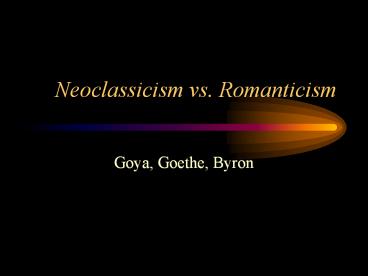Neoclassicism vs. Romanticism - PowerPoint PPT Presentation
Title:
Neoclassicism vs. Romanticism
Description:
Imitation of Greek and Roman originals. Dominance of pre ... Emphasis on the power of imagination, emotion, irrationality. Search for the transcendental ... – PowerPoint PPT presentation
Number of Views:1903
Avg rating:3.0/5.0
Title: Neoclassicism vs. Romanticism
1
Neoclassicism vs. Romanticism
- Goya, Goethe, Byron
2
- The sleep of reason produces monsters
- The dream of reason produces monsters
3
Neoclassicism
- Symmetry
- Proportion
- Order
- Clarity
- Restraint
4
Neoclassicism
5
Neoclassicism
Landscape with Aeneas on Delos
6
Neoclassicism
- Decorum
- Harmony
- Restraint
- Imitation of Greek and Roman originals
- Dominance of pre-established rules
Jean-Louis David, Oath of the Horatians
7
Neoclassicism
- Purpose of art to instruct by delighting
- Dominance of the moral over the aesthetic
function of art.
8
Romanticism
J.M.W. Turner, Snow Storm - Steam-Boat off a
Harbour's Mouth
9
Romanticism
Caspar Friedrich, Abbey in the Oak Wood
10
Romanticism
11
Romantic Garden
12
Romanticism
- Prevalence of the individual, subjective,
personal, spontaneous - Emphasis on the power of imagination, emotion,
irrationality - Search for the transcendental
- Appreciation for the power/beauty of untamed
nature
13
Romanticism
- Emotion over reason, senses over the intellect
- Preoccupation with genius, the individual, the
exceptional - Artist as the supreme creator
- Rejection of rules, importance of experimentation
- Imagination as way to reach transcendental
experience/truth - Predilection for the exotic, mysterious, weird,
occult, monstrous, diseased, satanic - Search for national, autochthonous origins
(resurgence of medieval, revaluation of
Shakespeare, Calderón, Lope de Vega)
14
Francisco de Goya y Lucientes 1746-1828
- His life is described as having four stages
- Until 1793 slow rise to maturity
- 1793 illness that left him deaf and released
pent up creative forces within him - 1808 Napoleonic invasion and Goyas responses
to the war. - 1819 a second illness, he retires to the Quinta
del Sordo, the Black Paintings
15
First Stage Tapestry Cartoons
- General impression?
- Calm, peace, harmony
- Lack of emotion
- Beauty, grace
- Balance
16
1808 1814 Napoleon and the War of Independence
The 3rd of May, 1808
17
The disasters of the war
18
(No Transcript)
19
The Colossus between 1808-1812
- Ambiguity of giant
- Ignorant, arrogant prince? (Ferdinand VII)
- Mountains the powerful
- Donkeynobility
- Hercules who rises up against Napoleon?
- Buried to above the knees
- Back to spectator
- Closed eyes
20
Black Paintings 1820-1823
The witches Sabbath
21
Saturn eating his son
22
(No Transcript)
23
Johan Wolfgang von Goethe (1749-1832)
- Perhaps the most important German writer (poet,
essayist, dramatist, novelist) - Collected works form around 144 volumes
- Most influential works The Sorrows of Young
Werther (1774), Wilhem Meister (1821-1829), Faust
(Part I, 1808, Part II 1832) - A principal figure of the Sturm und Drang movement
Portrait by Eugene Delacroix
24
George Gordon, Lord Byron (1788-1824)
- Perhaps the best known of the English Romantic
poets - Main works
- Childe Harolds Pilgrimage (1812-1818)
- Manfred. Dramatic Poem. (1817)
- Don Juan (1819-1824)
25
Byronic hero
- Exiled or solitary wanderer
- Moody, passionate
- Superior intellect
- Heightened sensitivity
- Rejects traditional values and moral codes
26
Prometheus
- Rebel god (Titan)
- Stole fire from Zeus and gave it to man
- Chained to a rock
- Eagle ate his liver each day
- 13 generations later, Heracles killed the eagle
27
Prometheus, Gustave Moreau
28
Some Romantic works based on the Prometheus myth
- Johann Wolfgang von Goethe, Prometheus (1774)
- Ludwig van Beethoven, opus 43, Creatures of
Prometheus (ballet), overture (1801) - Lord Byron, Prometheus
- Percy Shelley, Prometheus Unbound (1820)
- Mary Wollstonecraft Shelley, Frankenstein or the
Modern Prometheus (1818, 1831)
29
Goethe and Byrons Prometheus
- In groups of three discuss the following and
choose an image that you feel is particularly
powerful to exemplify each - How the Gods (Zeus, in particular) are
characterized. - How Prometheus is characterized.
- What stage of the Promethean myth is presented.
- How the attitudes of the two poets differ.































